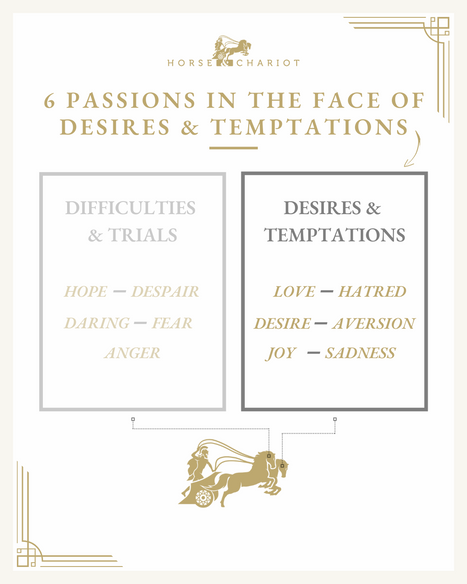All Series > Well-Ordered Soul > Part 7
Passions of Desire
(Series 2, Part 7, Teaching #15)
Watch: On YouTube
Passions of Desire
The passions in the face of desires and temptations—known as the concupiscible passions—moderate things like eating, drinking, what one thinks about, looks at, says, and so on. These passions are love, hatred, desire, aversion, joy, and sadness. Note: the passions of love and hatred here refer not to moral virtue or vice, but to the natural attraction to what is fitting and the repulsion from what is not.
To bring these to life, imagine some friends invite you out for a night on the town after a tough week. If you feel you can enjoy the evening while remaining in control, you experience love—recognizing the gathering as good and fitting. That love then stirs desire, moving you to attend. If, on the other hand, you sense the night may lead to excess indulgence and regret, you experience hatred—not of the people, but of the situation, as it appears unfit for you. That hatred then stirs aversion, moving you to decline. If you go, enjoy yourself, and remain temperate, you experience joy. But if you give in to excess—of eating, drinking, or lack of self-control—you are left with sadness.
This is the pattern of the passions. And yet, many repeatedly give in to desires they know they should resist. They continue doing what, deep down, they despise. And so, they walk through life with an undercurrent of sadness—because they remain enslaved by vice.
But the way of virtue is the way of freedom and fulfillment. It does not silence desire; it sanctifies it. The virtuous one does not ignore the passions but orders them—redirecting the loves of the heart, the desires of the flesh, the aversions of the will—toward God, not the body. Knowing, “The life of the body is the soul; the life of the soul is God” (St. Anthony of Padua). Thus, the will of self, the pull of the flesh, and the pressure of the world no longer rule them. Instead, they are ruled by grace. Their passions are not repressed but redeemed.
This is how you become who God wills you to be—not by killing the passions, but by sanctifying them. Ordered rightly, these passions become fuel for your journey, drawing you not into sin but deeper into the beauty of a virtuous and fulfilled life.
And so, “Desire to see God, be fearful of losing Him, and find joy in everything that can lead to Him. If you act in this way, you will always live in great peace” (St. Teresa of Avila). Learn to watch the movements of your desires. Reflect on what you are drawn to and why. Examine your aversions and what they reveal about your heart. Then choose what is good, not what is easy. Practice temperance. Practice clarity. And when the passions rise—as they always do—let your will, illuminated by grace, take the reins and guide them well. For in this ordered harmony, the soul begins to flourish, and life becomes a steady ascent toward the joy, freedom, and fulfillment God desires for you.

Scroll down for the lesson plan and other related resources associated with this teaching.
Copyright © 2022 Horse & Chariot. All rights reserved.
New teachings like this are released often. Subscribe free and never miss a teaching!
Resources

Visual Resource
Illustration highlighting the passions of the soul in the face of desires and temptations.

Free Lesson Plan
Perfect for small groups, families, classrooms, or personal reflection.

5-Minute Deep Dive
Deepen your understanding of this source teaching by listening to a brief podcast-style discussion (powered by Google Gemini).
Related Scripture
“Let love be genuine; hate what is evil; hold fast to what is good.” — Romans 12:9 (NRSVue)
“Take delight in the Lord, and he will give you the desires of your heart.” — Psalm 37:4 (NRSVue)
“Fallen, fallen is Babylon the great, that made all the nations drink the wine of her licentious passion.’” — Revelation 14:8 (NABRE)
“Rather, each person is tempted when he is lured and enticed by his own desire.” — James 1:14 (NABRE)
“But now I am happy—not because I made you sad, but because your sadness made you change your ways. That sadness was used by God, and so we caused you no harm. 10 For the sadness that is used by God brings a change of heart that leads to salvation—and there is no regret in that! But sadness that is merely human causes death.” — 2 Corinthians 7:9-10 (GNT)
“The desire of the righteous ends only in good, the expectation of the wicked in wrath.” — Proverbs 11:23 (NRSVue)
“I have said these things to you so that my joy may be in you and that your joy may be complete.” — John 15:11 (NRSVue)
“May those who sow in tears reap with shouts of joy.” — Psalm 126:5 (NRSVue)
“A joyful heart is the health of the body, but a depressed spirit dries up the bones.” — Proverbs 17:22 (NABRE)
“For God has revealed his grace for the salvation of all people. That grace instructs us to give up ungodly living and worldly passions, and to live self-controlled, upright, and godly lives in this world, as we wait for the blessed Day we hope for, when the glory of our great God and Savior Jesus Christ will appear. He gave himself for us, to rescue us from all wickedness and to make us a pure people who belong to him alone and are eager to do good.” — Titus 2:11-14 (NRSVue)
Related Quotes
“The life of the body is the soul; the life of the soul is God.” — St. Anthony of Padua
“Desire to see God, be fearful of losing Him, and find joy in everything that can lead to Him. If you act in this way, you will always live in great peace.” — St. Teresa of Avila
“When the soul has passed through the doctrine of Christ crucified, with true love of virtue and hatred of vice, and has arrived at the house of self-knowledge and entered therein, she remains, with her door barred, in watching and constant prayer, separated entirely from the consolations of the world.” — St. Catherine of Siena
“It is not the possessions but the desires of mankind which require to be equalized.” — Aristotle
“Now how do the concupiscible passions operate? The movements of the human appetite are forces of attraction. The concupiscible passions relate to a good or evil considered absolutely. Any time you feel the desire to eat a pint Cherry Garcia ice cream, commit adultery, avoid confessing your sins, or hate your boss, your concupiscible passions are stirring.” — Dr. Taylor Marshall
“I count him braver who overcomes his desires than him who conquers his enemies; for the hardest victory is over self.” — Aristotle
“No man is free who is a slave to the flesh.” — Seneca
“[Joy] is an expression of the soul in considered actions.” — Aristotle
“Man cannot live without joy; therefore when he is deprived of true spiritual joys it is necessary that he become addicted to carnal pleasures.” — St. Thomas Aquinas
“Bring your desires down to your present means. Increase them only when your increased means permit.” — Aristotle
“Pleasure is the bait of sin.” — Plato
“Goodness is to do good to the deserving and love the good and hate the wicked, and not to be eager to inflict punishment or take vengeance, but to be gracious and kindly and forgiving.” — Aristotle
“In the realm of evil thoughts none induces to sin as much as do thoughts that concern the pleasure of the flesh.” — St. Thomas Aquinas
“Serve God joyfully. Let there be no sadness in your life: the only true sorrow is sin.” — St. Mother Teresa
“Not every love, but only that which has a noble purpose, is noble and worthy of praise.” — Plato

Never miss a teaching — get all new teachings of virtue sent to your inbox free!
